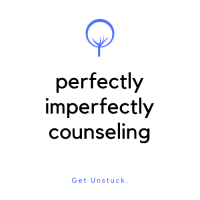Many people ask me, “What is online therapy? It can’t be as good as office therapy”. As a therapist, I, too, had these questions for my own therapy. I wanted to know what it felt like to try it. It was something I had to believe myself before I offered it. So, I set out on a quest to check out all sorts of teletherapy. Here’s what I found out.
The Different Types of Online Therapy
The cool thing I’ve learned is that there are so many different types of online therapies available. Different platforms, different therapeutic techniques, different means of communicating. I believe mental health should not just be so black and white, in an office/hospital/care center or nothing. Mental health can be achieved in many places, on a phone, text, video, walking and talking, and emailing.
Types of online mental health therapy:
- phone
- video
- texting
- emailing
“Telehealth” is an umbrella term that is used for insurance purposes. Doctors are starting to use it more and more, and as we become more technologically dependent, I believe it will be used in even more ways than we can imagine in the next few years. I remember the first time my general practitioner offered my medical records to be sent through an online portal. I could also ask questions directly to my doctor, skipping out on the hour Los Angeles commute to see him. And, anyone who’s lived in LA knows how priceless this is!

Talkspace and Betterhelp vs. Private Practice Online Therapists
Talkspace and Betterhelp
Mental health practitioners are starting to embrace the idea of online tools to offer their clients. When I first started my research into online therapy, I heard of Talkspace and BetterHelp, two giant online therapy platforms that offer mental health therapy for a low cost. It’s a cool concept, if you’re new to mental health therapy and are on a budget.
I tried Talkspace as a client. I had my first male therapist, and I paid $30 a week to get unlimited texting to my therapist. I could text him as much as I wanted throughout the day, and he would generally respond one giant text at the end of the day. This was helpful for a few weeks, but what I noticed was that simply writing out my feelings in a text would be enough for me to work through my own problems. I realized it was a way to journal. And by the time my therapist would text me back, I would already be on to the next problem. I began to be my own therapist. It wasn’t for me. But, I’m not saying it wouldn’t be helpful to others.
I could have also spent more money and had video therapy with my TalkSpace therapist, but, at the time, I didn’t have the money. I was a poor graduate student. The texting option was convenient and just in my budget.
Online Therapists in Private Practice
I then decided to get an online therapist that had a private practice. Since I’m in California, I had to find a therapist licensed in California. Therapists may not do online therapy for clients that live outside of the state they are licensed in (for example, I live in California, so I have to have a California licensed therapist). In California, telehealth is covered by most insurance companies. So, I was fortunate to be able to pay for my online mental health therapy with my insurance.
Working with a private practice therapist was my jam! She was attentive to my individual needs, and I had 50 minutes with her each week through a HIPAA compliant video platform. We used Zoom. I was able to meet her from my house, sometimes in my car (not driving, I pulled to the side of the road), and I loved not having to leave work to drive in LA traffic for a 50 minute appointment.
I didn’t experience any difference in my therapy from office therapy to online therapy. At first, it was awkward to get used to a new therapist, but this is normal in office, too. I was more comfortable in my own room, sometimes with my dogs and my favorite blankets. It really helped to get to the root of my problems quicker. Something I wouldn’t have gotten to as quickly in an office. But, that’s just me.

Pros of online therapy:
- convenience: be with your favorite pillows, on the go, with your pets, in your favorite place
- flexibility: I could do text, email, and video from my phone/computer anywhere in the state
- effectiveness: online therapy has been found to be just as effective as office therapy
- better hours: most online therapists have early morning, night, and weekend availability
- couples therapy: my partner and I could also log on from different locations and still do therapy
- affordable: although it’s usually the same price in private practices, there are many online options that are affordable
- file/screen sharing: I could share a video, article, meme with my therapist on my screen, then process it!
- sickness: I could be sick and still have therapy without worrying about getting others sick or getting out of bed!
- chronic pain: people with chronic illness or pain can still get therapy from their homes
- agoraphobia/anxiety: people who feels anxious about leaving their homes or social anxiety can still receive therapy!
- depression: when you are at your worst and you don’t want to get out of bed, you don’t have to!
- quick check ins: I offer quick 30 minute session to my clients. This is a great option for those weeks that are specifically more difficult than others. I wouldn’t want to drive in LA traffic for a 30 minute office appointment.
- Parents can get therapy: often, parents have to find care for their kids to get therapy. This is expensive and takes extra time. Online therapy allows parents to get quick time away while still in their home.
Cons of online therapy:
- Wifi: it needs to be a good connection. Sometimes some audio/video glitches happen, but the therapist usually has a backup plan, like doing a phone session.
- Hugs: I am a hugger. Some people aren’t. I miss the ability to give my therapist a hug. And as a therapist, some of my clients mention this to me that they wish they could hug me. We do “air hugs” online, if needed.
- Distractions: being at home or in a car can often run the risk of distractions interrupting therapy. I remind my clients to make sure they are free of distractions and set up their space as a safe space with confidentiality.
- People are skeptical of it: Trust me. I get haters all the time saying, “online therapy is not as good as office therapy”. This is simply B.S. and the nay-sayers are just people who haven’t tried it. I have tried it. I have been a client and I am also an online therapist. Online therapy is just as effective, if not more at times, as office therapy. Here is also some research that proves this.
Reasons I wouldn’t do online therapy with a client
- Suicidality: This is outside the scope of online therapy. I believe, as other online therapists do too, that if you are feeling like you want to kill yourself, you should call 911 or go to your nearest hospital. Online therapy is not indicated for clients that are suicidal.
- Some disorders require in person therapy for efficacy. These may be intellectual disorders, psychotic episodes, etc. But, when you call a therapist, they should assess whether or not online therapy is a good fit for your issues.
- Children: I know of some therapists that can work with children online, but in general, I find children need play therapy and no distractions. I don’t know of may children that can sit in front of a screen without distraction. So, make sure you get in person therapy for children. Some teenagers can do online therapy, but, the therapist would need to assess.
Finding the right therapist
I enjoy helping prospective clients find the right fit for them. At Perfectly Imperfectly Counseling, we have a team of online therapists that have many different specialties. We pride ourselves in getting out there, advocating for online mental health therapy, and knowing when we need to refer out to someone else. So, let us help! If you are interested in therapy, no matter where you live, let us help! We can help guide you in the right direction.
Contact us for a free consultation!

Great articles on the efficacy of online therapy!
Mobile Technology Boosts the Effectiveness of Psychotherapy and Behavioral Interventions
TELEMEDICINE VERSUS IN‐PERSON DELIVERY OF COGNITIVE PROCESSING THERAPY FOR WOMEN WITH POSTTRAUMATIC STRESS DISORDER: A RANDOMIZED NONINFERIORITY TRIAL (2015)
The Effectiveness of Telemental Health: A 2013 Review
Psychotherapy via internet as good as if not better than face-to-face consultations
Internet-based vs. face-to-face cognitive behavior therapy for psychiatric and somatic disorders: an updated systematic review and meta-analysis
Michelle Taylor is a Licensed Professional Clinical Counselor (5004) in the state of California. Michelle has been an online therapist specializing in anxiety, depression and relationships. Michelle works online with individuals and couples. If you are interested in working with Michelle, please contact her at (313)509-8817 or email her at michelletaylorlpcc@perfectlyimperfectly.com


